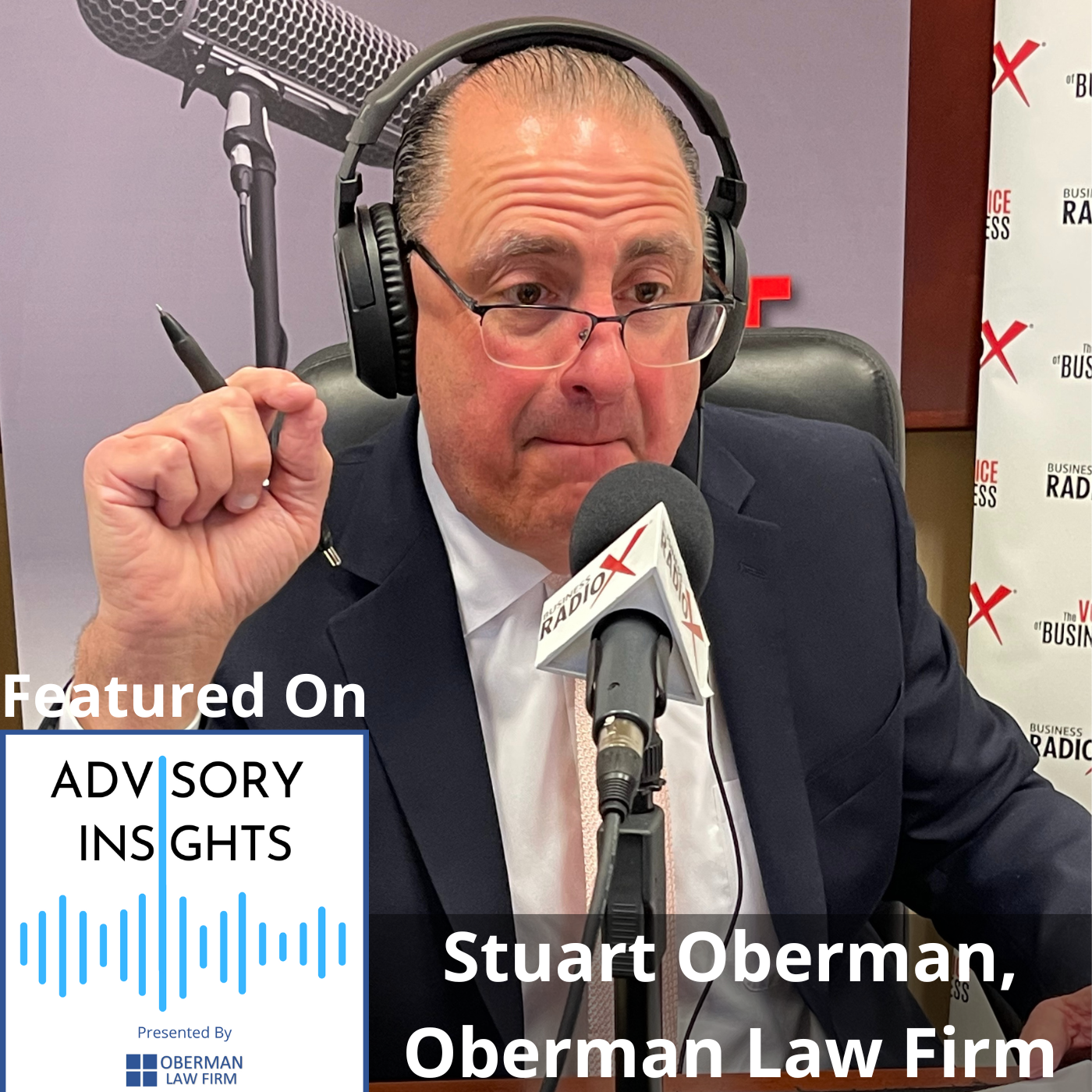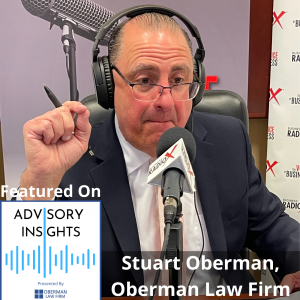
Employee Pay Inequity: The New Frontier (Advisory Insights Podcast, Episode 24)
On this episode of Advisory Insights, Stuart Oberman of Oberman Law Firm discussed laws regarding employer disclosure of pay ranges and how they differ in various states and municipalities. He also offered advice to employers on how to avoid potential problems with these laws.
Advisory Insights is presented by Oberman Law Firm and produced by the North Fulton studio of Business RadioX®. The series can be found on all the major podcast apps. You can find the complete show archive here.
TRANSCRIPT
Intro: [00:00:02] Broadcasting from the studios of Business RadioX, it’s time for Advisory Insights. Brought to you by Oberman Law firm, serving clients nationwide with tailored service and exceptional results. Now, here’s your host.
Stuart Oberman: [00:00:20] Hello everyone, and welcome to Advisory Insights. Stuart Oberman here, your host. All right, folks, we’re going to drill it down right now. Some ongoing legislation, big items going on, employee pay inequity. The new frontier.
Stuart Oberman: [00:00:38] So, a new front has emerged in state and local governments, and the federal government to a certain extent, regarding their attempts to qualify inequity in compensation. So, what’s happening is, is pay disclosure laws are taking several forms now. Some require employers to provide the minimum and even maximum pay or pay range for a given job application upon request. So, other states are now mandating the practice without even requirements that candidates ask first.
Stuart Oberman: [00:01:19] So, I want to take a look at a couple of states that they always seem to be out and frontal things that really affect employee compensation. So, I want to go through a couple of states, and this will give you an idea of where things are going with this.
Stuart Oberman: [00:01:36] First off, let’s take a look at California, all over the map, all over the map. They’ve got a new effective law coming in January 1, 2023 regarding all employers with 15 or more employees. So, if you don’t know what that is, I would strongly suggest that you pull that particular legislation. So, what we’re looking at, really across the board, is a lot of the same scenarios are going on across the states and states are picking up and copying what other states are doing.
Stuart Oberman: [00:02:10] Again, Colorado in January 1, 2021 enacted a new law affecting all employees. Again, in Colorado, do you know what that is? Connecticut, October 1, 2021 enacted legislation affected all employees. Maryland going back to October 1, 2020, again, legislation affecting all employees. Nevada, trailing a little bit as far as time goes, October 1, 2021 affected all employees.
Stuart Oberman: [00:02:45] Jersey – now get this one, Jersey. So, you got to love New Jersey. I mean, you’ve got to love those guys, right? – so April 13, 2022 – get a load of this – Jersey City, they got now laws that all employees in the city with five or more employees. Again, Jersey City, new law, April 13, 2022, all employers in the city with five or more employees. You got to know it.
Stuart Oberman: [00:03:14] I’m going to New York. New York is fantastic. You have to love New York City. The heartbeat of America. All employers in a city with four or more employees. New York City, November 1, 2022. Oh, now we’ve got a new law in Ithaca. I can’t make this up. September 1, 2022, Ithaca, all employers in the city with four or more employees. Or Chester County, New York – you got to love those guys – November 6, 2022. Again, you’ve got different cities enacting different laws as far as employees go.
Stuart Oberman: [00:03:49] So, in Westchester County, all employers in the county with four or more employees. Great. So, now your company, you work in three different cities in New York and you got a problem. Let’s look at our friends out in the Midwest. Ohio, I love Ohio. Cincinnati got their own set of laws. All employers located within the city with 15 or more employees, including referral and employment agencies.
Stuart Oberman: [00:04:20] So, now, we jump right on up to Toledo. Again, one state. We’ve got different laws. June 25, 2020, all employers located within the city with 15 or more employees, including referral and employment agencies. You have to love the Midwest. Again, folks, I know I’m sort of picking on those guys. But, again, let’s look at Rhode Island, January 1, 2023 enacted a law, all employers. Washington, Northwest – here we go – all employers in the state with 15 or more employees.
Stuart Oberman: [00:04:57] Why am I reviewing this? Why am I reviewing this? In today’s world, where you have remote employees everywhere, some of our clients have employees in 15 or 30 states, some employers probably have employees in every state. If you’re an employer, you have got to know where your people are at, what the law is, what the state, what the county law is, and what the municipality laws are.
Stuart Oberman: [00:05:29] Because otherwise you’re going to run into different problems, different payrolls. You’re going to have to revise. If you’re a city like New York and you’re a city like Ohio, and you have three or four different employer issues, you’ve got to understand where these things are going.
Stuart Oberman: [00:05:46] So, a couple of things to look at. So, what are we going to look at as far as requirements go? Look at what the disclosure requirements are. Look at disclosure pay or pay ranges upon request or certain conditions that employers and employees are referred to. Look at the disclosure pay ranges. Look at the disclosure upon all job listings. Are you required to list the pay now for job descriptions on a locality level, statewide level? Again, folks, you got to understand this.
Stuart Oberman: [00:06:26] Again, this is for our employers on a national basis. So, just be aware. These are all hot buttons. Pay inequity, literally, it’s a smoldering fire waiting to explode. And I think we’re probably not too far from that area.
Stuart Oberman: [00:06:43] Folks, I appreciate your time listening to me today. Again, what do we need to do as far as localities go? Let’s look at that. If you have any questions, please feel free to give me call, Stuart Oberman, 770-886-2400 or stuart, S-T-U-A-R-T, @obermanlaw.com. Folks, thanks for listening. Join our additional podcasts to follow. Have a fantastic day.
Outro: [00:07:11] Thank you for joining us on Advisory Insights. This show is brought to you by Oberman Law Firm, a business-centric law firm representing local, regional, and national clients in a wide range of practice areas, including health care, mergers and acquisitions, corporate transactions, and regulatory compliance.
About Advisory Insights Podcast
Presented by Oberman Law Firm, Advisory Insights Podcast covers legal, business, HR, and other topics of vital concern to healthcare practices and other business owners. This show series can be found here as well as on all the major podcast apps.
Stuart Oberman, Oberman Law Firm

Stuart Oberman is the founder and President of Oberman Law Firm. Mr. Oberman graduated from Urbana University and received his law degree from John Marshall Law School. Mr. Oberman has been practicing law for over 25 years, and before going into private practice, Mr. Oberman was in-house counsel for a Fortune 500 Company. Mr. Oberman is widely regarded as the go-to attorney in the area of Dental Law, which includes DSO formation, corporate business structures, mergers and acquisitions, regulatory compliance, advertising regulations, HIPAA, Compliance, and employment law regulations that affect dental practices.
In addition, Mr. Oberman’s expertise in the healthcare industry includes advising clients in the complex regulatory landscape as it relates to telehealth and telemedicine, including compliance of corporate structures, third-party reimbursement, contract negotiations, technology, health care fraud, and abuse law (Anti-Kickback Statute and the State Law), professional liability risk management, federal and state regulations.
As the long-term care industry evolves, Mr. Oberman has the knowledge and experience to guide clients in the long-term care sector with respect to corporate and regulatory matters, assisted living facilities, continuing care retirement communities (CCRCs). In addition, Mr. Oberman’s practice also focuses on health care facility acquisitions and other changes of ownership, as well as related licensure and Medicare/Medicaid certification matters, CCRC registrations, long-term care/skilled nursing facility management, operating agreements, assisted living licensure matters, and health care joint ventures.
In addition to his expertise in the health care industry, Mr. Oberman has a nationwide practice that focuses on all facets of contractual disputes, including corporate governance, fiduciary duty, trade secrets, unfair competition, covenants not to compete, trademark and copyright infringement, fraud, and deceptive trade practices, and other business-related matters. Mr. Oberman also represents clients throughout the United States in a wide range of practice areas, including mergers & acquisitions, partnership agreements, commercial real estate, entity formation, employment law, commercial leasing, intellectual property, and HIPAA/OSHA compliance.
Mr. Oberman is a national lecturer and has published articles in the U.S. and Canada.
Oberman Law Firm
Oberman Law Firm has a long history of civic service, noted national, regional, and local clients, and stands among the Southeast’s eminent and fast-growing full-service law firms. Oberman Law Firm’s areas of practice include Business Planning, Commercial & Technology Transactions, Corporate, Employment & Labor, Estate Planning, Health Care, Intellectual Property, Litigation, Privacy & Data Security, and Real Estate.
By meeting their client’s goals and becoming a trusted partner and advocate for our clients, their attorneys are recognized as legal go-getters who provide value-added service. Their attorneys understand that in a rapidly changing legal market, clients have new expectations, constantly evolving choices, and operate in an environment of heightened reputational and commercial risk.
Oberman Law Firm’s strength is its ability to solve complex legal problems by collaborating across borders and practice areas.
Connect with Oberman Law Firm:
Company website | LinkedIn | Twitter
















